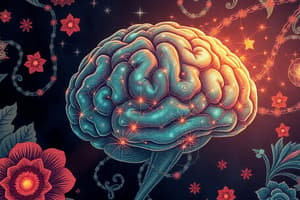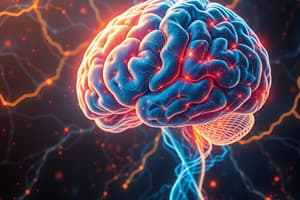Podcast
Questions and Answers
What is the primary focus of neuropsychology when working with individuals who have suffered from strokes or traumatic brain injuries?
What is the primary focus of neuropsychology when working with individuals who have suffered from strokes or traumatic brain injuries?
- Investigating the mind-brain connection
- Identifying patterns of neural activation using fMRI
- Determining how memories form and decay
- Developing treatments targeting information processing issues (correct)
Why has there been an increasing collaboration between cognitive psychologists and neuroscientists in recent years?
Why has there been an increasing collaboration between cognitive psychologists and neuroscientists in recent years?
- To study patterns of neural activation
- To investigate memory load effect
- To understand the mind-brain connection (correct)
- To explore cranial trauma effects
What important role does memory play in mental life according to the text?
What important role does memory play in mental life according to the text?
- Enhancing neural activation patterns
- Allowing humans to perceive their environment
- Enabling humans to retain and recall important experiences (correct)
- Aiding in physical recovery after injury
How does neuropsychological assessment contribute to clinical care?
How does neuropsychological assessment contribute to clinical care?
What does cognitive neuroscience investigate with the help of tools from various scientific disciplines?
What does cognitive neuroscience investigate with the help of tools from various scientific disciplines?
Which technique does neuropsychology use to reveal patterns of neural activation underlying complex human interactions?
Which technique does neuropsychology use to reveal patterns of neural activation underlying complex human interactions?
What is the primary goal of neuropsychology?
What is the primary goal of neuropsychology?
Which of the following is NOT a focus area of neuropsychology?
Which of the following is NOT a focus area of neuropsychology?
What specific brain functions can cognitive tests assess?
What specific brain functions can cognitive tests assess?
How does neuropsychology help identify deficits in cognition?
How does neuropsychology help identify deficits in cognition?
Which area of human thought is NOT typically studied in neuropsychology?
Which area of human thought is NOT typically studied in neuropsychology?
What type of patients do neuropsychologists often study to understand brain activity?
What type of patients do neuropsychologists often study to understand brain activity?
Flashcards are hidden until you start studying
Study Notes
Neuropsychology
Neuropsychology is an interdisciplinary field of study that combines psychology with knowledge from biology, medicine, and other sciences related to the nervous system. It focuses on understanding how the structure and function of the human brain relates to behavior, cognition, emotion, and mental health. In essence, it's concerned with the relationship between brain activity and our thoughts, feelings, behaviors, abilities, and disabilities. Its practitioners work to understand and measure these relationships by studying symptoms, diagnoses, prognoses, mechanisms of action, and outcomes in brain injury and disease patients through psychological testing.
Brain Functions
The primary goal of neuropsychology is to better understand various aspects of human thought, including attention, perception, memory, motor control, problem solving ability, decision making, and emotions. To achieve this, researchers often employ cognitive tests designed to assess specific brain functions, such as reaction time, visual acuity, short term memory, and verbal comprehension. These tests can help identify deficits in different areas of cognition when individuals experience physical damage due to accidents, strokes, tumors, or exposure to toxic chemicals.
Neurological Disorders
One significant aspect of neuropsychology involves working with people who have suffered neurological insults—such as strokes, traumatic brain injuries, degenerative diseases like Alzheimer’s, seizure disorders, or motor neuron disease, and disorders of consciousness. By examining their responses to cognitive tasks, neuropsychologists aim to determine what information processing issues arise from these conditions and develop treatments that target those difficulties specifically.
Cognitive Neuroscience
In recent years, there has been increasing collaboration between cognitive psychologists and neuroscientists because both fields share interest in understanding the mind-brain connection. This integration has given birth to cognitive neuroscience which uses tools from many scientific disciplines to investigate how the brain enables us to perceive, think, learn, remember, communicate, make decisions, and interact with others. It helps explain why certain cognitive functions may go awry when parts of the brain become damaged during cranial trauma or acquire pathologies over time.
Memory Processes
Memory plays a crucial role in mental life, allowing humans to retain and recall important experiences throughout their lives. Neuropsychology seeks to decipher how memories form, persist, and decay across the lifespan using techniques like functional magnetic resonance imaging (fMRI) which reveals patterns of neural activation underlying complex human interactions. This understanding could lead to novel approaches for enhancing mnemonic capabilities or improving rehabilitation after injury.
Neuropsychological Assessment
An essential component of clinical care within neuropsychology is the administration and interpretation of standardized tests. These tests yield valuable data regarding an individual's strengths and weaknesses that clinicians can integrate into treatment plans aimed at optimizing physical recovery while addressing residual impairments with targeted remediation efforts. For instance, if an accident victim presents with memory loss, psychometric batteries might reveal 'memory load effect', suggesting the patient struggles less with short-term than long-term storage; such insights guide personalized therapy design.
In summary, neuropsychology offers a unique perspective on human behavior by exploring its roots within biological systems—the brain. By carefully examining brain functions, identifying symptoms associated with neurological disorders, and developing evidence-based therapies based on cognitive principles, neuropsychologists contribute significantly to our overall understanding of ourselves and our minds.
Studying That Suits You
Use AI to generate personalized quizzes and flashcards to suit your learning preferences.




